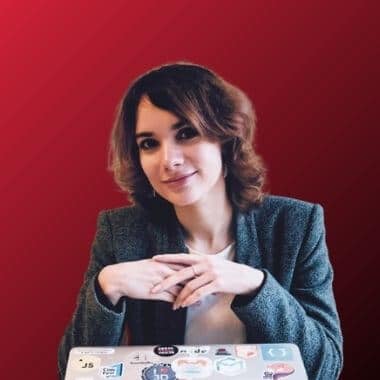How does one grow as a front-end developer? We chat with Vasilika Klimova, senior front-end developer at Avaloq and founder of the SkillUp School in Luxembourg, about why soft skills and not over-engineering are key to advancing as a front-end dev and in your web developer carer.
How to grow as a front-end developer
Why did you decide to go into web development? What’s your web developer career story?
Actually, web development wasn’t my first choice at all. I have been playing video games since I was three years old, and, at first, my idea was to become a game developer. I studied C and C++ at university. You can get into this industry through OpenGL and all this stuff but, in Tver, my city of origin in Russia, we didn’t have any jobs for students in this area. So, I found some web development vacancies and decided to try it, and by the fourth year of university I got my first job as a web developer as a Webmaster. So, I started from scratch.
After working there for several years, I finished my university degree and moved Moscow. Then I had to decide if I wanted to go for back-end or front-end, as before I was full-stack. I was doing server code, business logic, all requests to the servers and database stuff, but also user interface. I did all of it. In Moscow there are bigger companies, and these usually have different web development teams, teams for front-end and teams for back-end. So, at this point I needed to decide: do I go as a back-end PHP developer, or as a JavaScript front-end developer? And I went for front-end because I’m a visual person. I need to see what I’m doing, and, when you work with a server, you usually look at the terminal and you see just code and not a lot of interfaces.
And what came next? You now live in Luxembourg. Why the change? What are you up to these days?
I’m actually in Luxembourg because of my previous job. I was a Front-End Team Lead at Artec 3D, a company that has offices in Moscow, Luxembourg, China and California, doing user interfaces and 3D-related tasks. After five years, I decided to switch and was approached by Avaloq’s HR department. They do banking software; it’s quite common to work in the banking industry in Luxembourg.
Avaloq is a much bigger company, and banking quite a regulated industry. Did you notice any differences as a front-end dev?
So, I went from a 200-people company to a 2,500 thousand one with 30 offices around the world. And some processes are not as fast.
Before, when I needed to ask someone within the company for something, I just went directly to them and asked them. But Avaloq has around 800 people at its main office in Switzerland. If you need some information, there are a lot of different teams, and you really need to investigate. For example, sometimes you are working on a project, and you need to find the people who wrote the code in the first place. And often, the only way to know who did this code is to look at who committed it. Coders and managers change, and the only way to find the author of the code is through the commit.
Join our community and find your next job in IT
And besides your job, you also work on some web projects, do consulting and give private lessons for adults and children. You are also the founder of SkillUp School, a school that teaches technical skills and how to advance your front-end web developer career. Tell us a bit more.
Yes. I started being a teacher and mentor for front-end development in 2015. I taught at schools in Russia, both online and offline. And after I had settled in Luxembourg and finally had some time in my hands, I decided to create SkillUp School, as I hadn’t seen that many schools like this in the country.
What we give to our students is this absolutely modern way of looking at front-end technologies, because as professional front-end developers, we are using them every day. We started in 2019. We don’t have too many students, and our main idea is to be very flexible for our students. People who want to change their career usually already have a job and not that much time to invest in their development. We only have two or three teams per year, so not big groups, and we are very flexible. It helps us take an individual approach to each student, and I often become even friends with them. After the course, I keep helping them grow and with any questions they have.
In your experience, what makes a good vs. a great web developer?
I think I started to think more about this when I became a team leader. Good developers can think from a technical standpoint, but a great developer, in addition to the technical aspect, knows how to take more of a business perspective. The main idea behind our job is to deliver something that makes our clients happy. You need to think about the business requirements, why you have these requirements, if there may be a more efficient way to create a feature that meets them and not overengineer. You need to ask yourself “Why?” several times.

I know some genius developers, but sometimes they end up over-engineering because they want to make something ideal, something perfect. But the business doesn’t need that. You need something now, for this and for that purpose. And you always need to keep timing in mind. If development takes more time, then you can run into problems. It’s more of the developer’s time, which results in more money. Don’t over-engineer. Relax and just keep it simple.
As a senior developer, how can more junior specialists grow as front-end developers?
To work on their soft skills, on how to learn, how to behave, work in teams, etc. If one day you’d like to become a team leader, it’s important to work on your team skills, on how to negotiate with web designers. Often developers have issues with designers because we materialise their design and they are not happy with what we created. You really need to have a grasp of some psychology basics for this.
What do you enjoy doing in your free time?
I like scuba diving. I already have more than 100 dives on my back and am a rescue diver, so I could rescue someone from the water, I hope. It’s so calming and beautiful under the surface. But I don’t have enough money to do it too many times a year. Usually maximum twice per year, unfortunately. Covid-19 has made it particularly hard too.
I also like playing board games and having a nice time with friends. I still play computer and video games sometimes. Not to compete, but it’s just something that helps me relax. I am partial to games with and interesting and breath-taking plot.
Your favourite video game?
Mass Effect, the first and third ones.
Check out more of our interviews from our podcast episodes.
For more tips on how to advance your web developer career, make sure to check Vasilika’s website and follow her on Twitter, GitHub, and LinkedIn.
